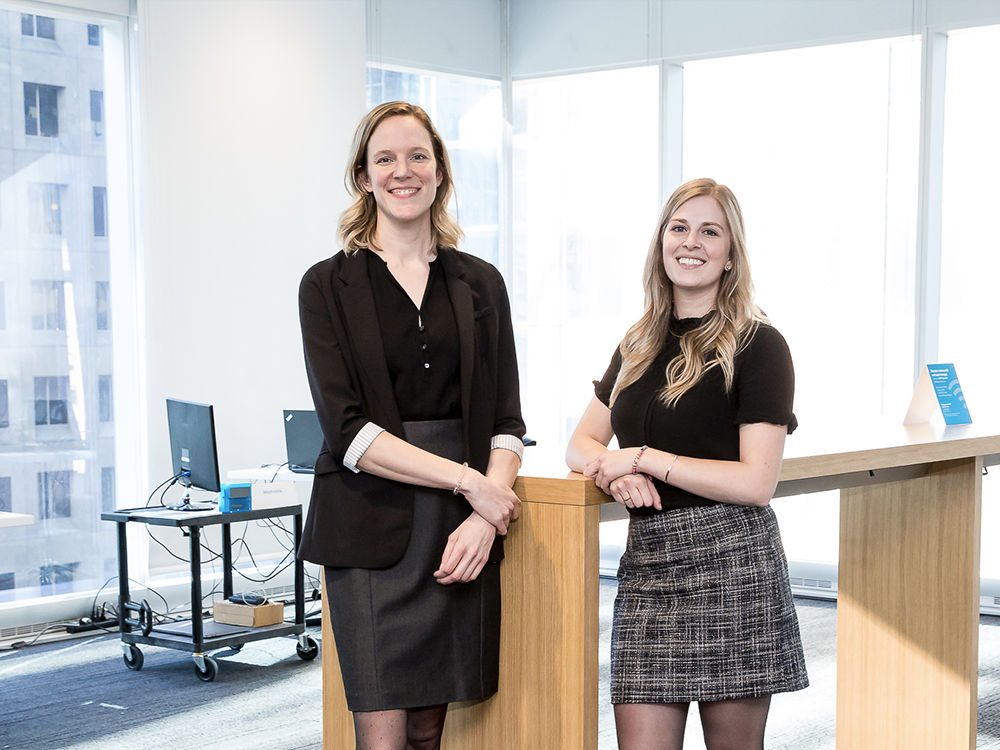
AYOS Diagnostic: Molecular diagnostics for agriculture
A blog post by Chloé Dussault-Benoît
Making a real impact
As far back as I can remember, I’ve always been passionate about agriculture, biology and research. Once I completed my bachelor’s in agronomics, I wanted to have a concrete impact on farmers’ everyday lives. So I decided to continue on to a master’s in plant pathology (the study of plant diseases) in order to be able to help famers manage the destruction. However, I had no idea at that time that my master’s thesis was what would allow me to have the effect I was looking for in the agricultural sector.
The spark of an idea
The goal of my master’s thesis project, developed in collaboration with doctoral student Geneviève Arsenault-Labrecque, was to create a molecular diagnostic tool that would enable the rapid, precise identification of various strains of a major disease that attacks soy crops. While I was starting the second and final year of my master’s, my research supervisor filed a patent application to protect the technology we were developing. It was at that moment that they suggested to us, “Why don’t you market the technology yourselves?” At that exact moment, the idea stuck in my mind and never left. And yet I never would have guessed I would end up exchanging my scientist’s uniform for that of an entrepreneur.
With our first business plan in hand, created thanks to the help of SOVAR, an organization that facilitates the marketing of laboratory innovations, we participated in several contests, including Acfas’ Génies en affaires, for which we won second prize. This contest allowed ourselves and our business venture to get exposure, amongst other benefits, and to have our business plan challenged by professionals. It also allowed us to widen our network of contacts by meeting other entrepreneurs in other sectors. In addition to being a rewarding experience, it really confirmed in my mind that our company, AYOS Diagnostic, was a great business idea. Last year, AYOS was selected to be part of the 2020 cohort at the Académie entrepreneuriale ULaval-CDPQ, which provides intensive training to entrepreneurs starting a business.
A look at our technology
AYOS Diagnostic is first and foremost a business aiming to offer a diagnostic service to soy producers that enables them to test their fields for one of the most damaging diseases to their crops: Phytophthora root rot. Our diagnostic tool precisely identifies certain fungal genes that cause the disease—genes which can vary from one strain to another of the same fungus. Through identification of these different strains, we can know which types of soy may be resistant to the strain present in the producer’s field and make recommendations as to good varieties that would reduce losses caused by the disease. The concept is quite similar to identifying influenza virus and its related vaccine. Several strains of the virus exist and we need to precisely identify them to know exactly which vaccine will provide the population with protection against developing the illness. To date, testing that is as precise and rigorous as this has not existed for farmers. So we have a testing formula that could revolutionize diagnosing agricultural diseases, and already today it’s possible to effect hundreds of diagnostics of infected fields using this tool across Quebec and Canada.
Beneficial collaborations
In addition to working on my company, I’m conducting R&D at a laboratory at Université Laval to optimize the diagnostic tool. I consider myself lucky to be able to take advantage of access to the best equipment, and it’s the entire company that will benefit. Our close ties with the MAPAQ phytoprotection diagnostic lab as well as with a major supplier of seeds in Canada opens the door to future clients.
Before we launch our service across Canada, planned for 2021, we still have a few steps to complete: our incorporation, negotiating the use of the patent with Université Laval and obtaining the financing we need for our initial working capital.
We project that we’ll need to diversify our service offering in the future by developing tests for the various diseases that attack soy crops, but also for other agricultural crops. We hope to ease the lives of producers around the world who are struggling with this disease by developing molecular diagnostic tools that will be accessible on the international market.
In closing, I encourage all students who are also intending to start a company to participate in Acfas’ Génies en affaires contest. Their current call for entries ends January 28, 2021.
On the cover, from left to right: Geneviève Arsenault-Labrecque and Chloé Dussault-Benoit


